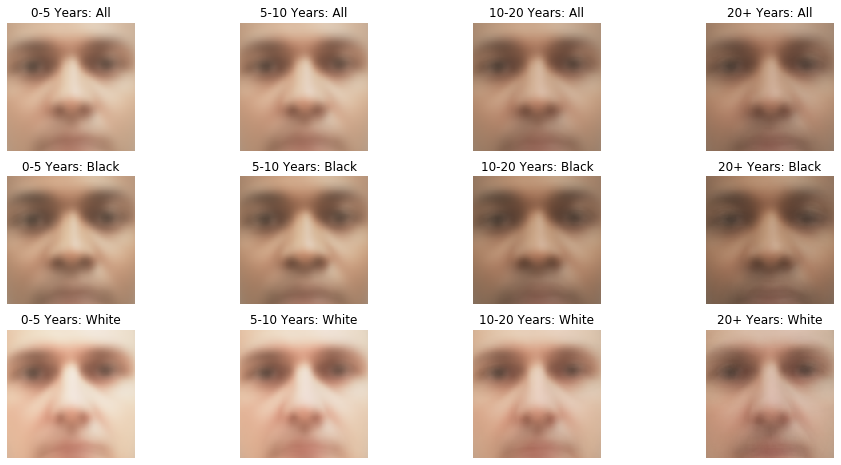Current Working Papers
Not so Black and White: An Algorithmic Approach to Detecting Colorism in Criminal Sentencing
Published in ACM SIGCAS Conference on Computing and Sustainable Societies (COMPASS) (COMPASS ’21), June 28-July 2, 2021.
Average Inmate by Binned Sentence Length

Abstract: It is well documented that individuals of different races have disparate experiences in the criminal justice system in the United States. As most studies focus on Black-white interracial differences, intraracial disparities are often overlooked. Analyzing intraracial disparities is further complicated by the fact that it has been historically difficult to accurately and consistently measure skin tone and Afrocentric features. Utilizing convolutional neural networks and photos as data, this study creates a consistent, running measure of perceived race. Using this new measure and data type, new types of analysis are possible. This study will present photographic summary statistics, show the positive relationship between perceived race and sentence length is robust to the inclusion of various controls and, reevaluate traditional Black-white gaps, measuring both inter- and intraracial disparities.
Full paper draft found here
The Impact of Ideological Diversity on Educational Performance: A Pilot Study
with Betsy Paluck, Cecilia Rouse, Jason Chin, and John-Henry Pezzuto
Abstract: What is known about the real-world educational effects of ideological diversity in the classroom? Surprisingly, given the amount of attention paid to the role of ideological diversity on higher education outcomes such as critical thinking and academic performance, scant causal evidence exists. We use a lab-in-the-field experiment to test whether the presence of ideologically more conservative students in academic discussion groups, as compared to groups of students who all slanted ideologically liberal, would improve academic outcomes in terms of the quality of each student’s individual academic work. The complete population of an incoming cohort of policy graduate students (N = 78) took part in the experiment. Results demonstrate that students assigned to the ideologically heterogeneous discussion groups subsequently wrote individual assignments that received significantly more negative grades by a professional grader blind to experimental condition and to student identity. Survey results from participating students also suggest that students in the ideologically heterogeneous discussion groups were also significantly more likely to perceive interpersonal conflict and to dislike their group dynamics—a result that was not driven by students of a particular ideological slant. As a small pilot, this study provides questions to resolve with future research, including the role of pedagogy in managing ideological diversity, and provides a template for future experimental designs
Full paper draft found here
